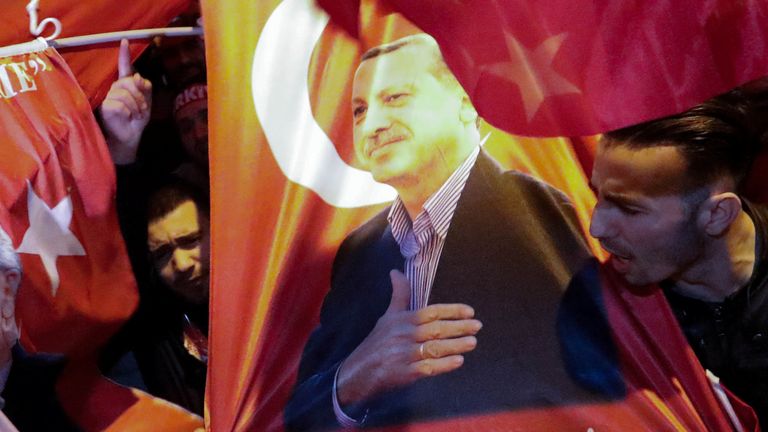'Unlevel playing field' in Turkey referendum campaign
Observers say the two sides "did not have equal opportunities" as Turkey's president warns it is too late to "belittle" his win.
Tuesday 18 April 2017 10:51, UK
Turkey's president has angrily rejected criticisms by international observers that the country's referendum campaign was conducted on an "unlevel playing field".
Turkey voted on Sunday in a plebiscite on granting President Recep Tayyip Erdogan extra powers that was won by the "Yes" camp but disputed by the opposition.
"The referendum took place on an unlevel playing field and the two sides of the campaign did not have equal opportunities," said Cezar Florin Preda of the joint mission of the OSCE Office for Democratic Institutions and Human Rights (ODIHR) and the Parliamentary Assembly of the Council of Europe (PACE).
"Late changes in counting procedures removed an important safeguard," said Mr Preda, who headed the PACE delegation, referring to the election authorities' decision to permit ballot papers without an official stamp.
"The legal framework, which is focused on elections, remained inadequate for the holding of a genuinely democratic referendum," the monitors said in a joint statement.
Mr Preda also said the fact that the referendum was held under a state of emergency imposed in the wake of last year's failed coup infringed upon a "fundamental freedom".
But Gulnur Aybet, a senior adviser to Mr Erdogan, told Sky News the "Yes" side had won "fair and square" and the reported number of ballot papers accepted without an official stamp was a "gross exaggeration".
Mr Erdogan responded to the OSCE mission's criticisms by saying: "Know your place."
He has warned opponents not to "belittle" his narrow victory, but the main opposition party has demanded the result be cancelled because the referendum was won through "illegal acts".
Speaking to reporters in Istanbul, Mr Erdogan said results showed a winning margin of 1.3 million votes in what he described as a "historic decision".
Striking a conciliatory tone following the bitter contest, Mr Erdogan called on foreign powers to respect the outcome - which will mean 18 constitutional changes - as he thanked the Turkish people.
But as he addressed thousands of flag-waving supporters in Istanbul a short time later, he was more defiant.
"There are those who are belittling the result. They shouldn't try, it will be in vain," he said.
"It's too late now."
The head of the country's electoral board confirmed the win shortly after Mr Erdogan spoke and said the final results would be known in 11-12 days.
The "yes" vote means Turkey's parliamentary system of government will be replaced with a presidential one and could see Mr Erdogan remain in office until 2029.
The office of prime minister is also set to be abolished, allowing the president to draft the budget, declare a state of emergency and issue decrees overseeing ministries without parliamentary approval.
The changes are due to come in after the next election, scheduled for 2019.
Opinion polls had shown a narrow lead for a "yes" vote before Sunday's ballot, but the country's three largest cities - Istanbul, Ankara and Izmir - and the mainly Kurdish southeast looked set to vote "no".
The referendum has bitterly divided Turkey and will affect the country's strained relations with the European Union.
Mr Erdogan has insisted the changes are needed to amend the current constitution, which was written by generals following a 1980 military coup, to confront security and political challenges in Turkey and avoid past fragile coalition governments.
But critics say the move grants sweeping powers to Mr Erdogan following last July's failed coup.
On Monday night, the government said it was extending the country's state of emergency by a further three months.






